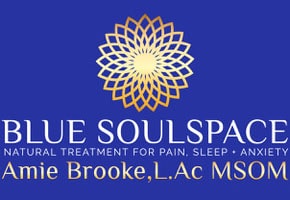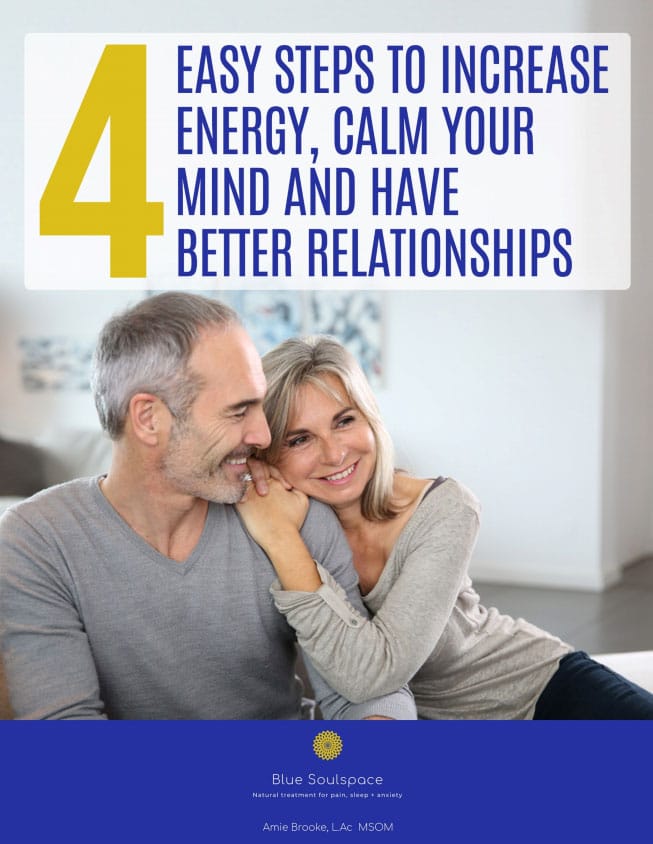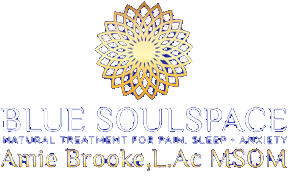Getting a good night’s sleep is elusive for many people. Perhaps the primary cause of insomnia and restless sleep is the whirlwind pace that most modern people live with day in and day out. Our society emphasizes ‘doing’ much more than ‘being’. From the perspective of Chinese Medicine, the yin aspect of life is quite depleted for the average modern American. If you have never heard of yin and yang, these are polar forces that are reflected in everything in the natural world. Yin is related to stillness, tranquility, and contemplation. Yang is related to movement, accomplishment, and function. We need yin and yang to be in balance within ourselves in order to experience true health and wellbeing- and also to relax into deep restorative sleep at night. When we are yin deficient, we easily become restless, irritable, and excessively busy. Our ability to rest and restore is compromised as we never seem to break from the constant activity in our minds and our lives.
Another way to look at this is our sympathetic nervous systems are on overdrive. We tend to get stuck in fight or flight mode as we try to keep up with hectic schedules, responsibilities and worrying about the future. Even in this recent pandemic we may have slowed down, but we haven’t really turned off. We are plugged into the daily news, social media feeds and talking with friends and family about what could go wrong. This creates excessive amounts of cortisol and adrenaline in our systems, which keep us feeling amped up and unable to rest. With the pattern of yin deficiency and a hyperactive sympathetic nervous system, we often feel too warm, excessively thirsty, dried out, and anxious. This pattern is also common in menopausal women.
When our body is in fight or flight, we often can’t identify when we are tired and feel wired or manic. Yet other times a deep-seated exhaustion is felt. No wonder when you hit the pillow your body doesn’t know what to do!
There are many other potential contributing causes of insomnia, including nutritional imbalances (such as low minerals), suppressed emotions, relationship troubles, hormonal imbalances, and energetic imbalances.
Let’s take a look at a few of the top natural treatment options for insomnia:
1) Acupuncture: All of the major organs of the body are related to specific kinds of insomnia. For instance, there is a liver/gall bladder insomnia in which one is kept awake strategizing, planning and scheduling their lives at night. This person often can’t turn their minds off unless they read or watch TV before bed. Likewise, there are kidney, heart, lung and spleen forms of insomnia that all have specific manifestations.
Acupuncture is an excellent treatment option for insomnia, regardless of its etiology. For chronic insomnia, I generally recommend receiving acupuncture once a week for 6 weeks to restore balance to the central nervous system and unblock stuck energy in the body or specific organs.
2) Herbs: There are many Chinese and Western herbs that can be very helpful for insomnia. Chinese herbs are typically used in combination to create formulas that treat specific patterns of disharmony. Western herbs are frequently used on their own. The great thing about the herbs listed here is that they don’t cause the drowsiness and disorientation that many of the Western sedative drugs do.
Valerian: Has mild sedative properties that help to relax the nervous system and calm the mind.
Kava: A highly prized medicinal that is used to alleviate anxiety and induce deeper sleeping patterns.
CBD/THC: in higher doses the cannabis plant has sedative properties and also anti-inflammatory effects. I suggest trying a simple CBD/Melatonin blend I carry in my clinic first and use THC only when necessary.
Gui pi tang: A Chinese formula that nourishes the heart and spleen, for insomnia with low energy, nightmares, anxiety, depression, and possibly night sweats.
Tian wan bu xin dan: A Chinese formula that balances the relationship between the heart and kidneys, for symptoms such as insomnia, low back pain, anxiety, feeling of heat, thirst, and night sweats.
Suan zao ren tang: A Chinese formula that nourishes the heart and liver, for insomnia irritability.
3) Meditation and Deep breathing: Meditation is a deeply restorative practice and can replicate many of the benefits of sleep. In fact, meditation is often considered to be even more beneficial because it can lead to a state of non-thought, which is said by many spiritual traditions to be the deepest state of relaxation and healing possible for human beings. In sleep, our minds are still processing and dreaming. Spend 15 minutes before bed meditating and it will quite likely allow you to fall asleep faster and to sleep more peacefully. There are some great apps I can share to help guide you through meditation and deep relaxation.
4) Yoga: Practiced for many centuries throughout the Eastern world, yoga has finally made its way to the West with unprecedented popularity. There are many different styles of yoga; I encourage you to experiment until you find a style that meets your needs. I recommend doing 15-20 minutes of restorative poses (child pose, shoulder stand, plow pose, corpse pose, standing forward bend, etc.) before bed. Combine this with your sitting meditation practice and you will take a significant step toward healing your nervous system.
5) Nutrition:
Caffeine. One of the obvious substances in terms of its effect on insomnia is caffeine. If you are drinking coffee, I recommend either cutting it out altogether for a period of time or switching to green tea. Coffee tends to irritate the nervous system, colon, and liver. It is very heating and stimulating and can be a major obstacle in healing insomnia. Green tea, on the other hand, is soothing to the gut and nervous system. It is cooling in nature and is loaded with antioxidants. While it does have some caffeine, it is still a much better choice than coffee.
Sugar. Another culprit in sleep disturbance is refined sugar. Regularly eating sugar causes increasing problems with the regulation of insulin and glucose, which will lead to hypoglycemia and possibly pre-diabetic symptoms. It has been clinically proven that blood sugar has a profound impact on the health of the nervous system. In order to keep blood sugar balanced, white sugar should be avoided or, at the very least, should be coupled with adequate protein intake. Sugar also causes inflammation in the body, which can adversely affect our ability to relax, rest and restore.
Alcohol. While some people claim that alcohol helps them sleep better, if you have chronic insomnia and drink regularly, it is certainly worth giving it up for a period of several weeks and see if your sleep improves. Alcohol also has an adverse effect on blood sugar and can easily irritate the liver, heart, and nervous system. Many people are sensitive to alcohol but haven’t identified it as a problem.
Diet. Simply put, the best thing you can do to heal nutritionally from most chronic health conditions, including insomnia, is to eat an organic whole foods diet that is rich in antioxidants, essential fatty acids, and fiber and to minimize processed foods, sugars, and refined carbohydrates.
Nutritional Supplements
Melatonin: Has been shown to help people fall asleep and in the right dose can reset your sleep patterns.
Fish oil: Essential fatty acids have numerous health benefits. They are often used in the treatment of emotional and mental imbalances and they tend to compliment other treatments that are used for insomnia. Don’t take them right before bed however, as they can be stimulating!
5HTP and L-Tryptophan: A precursor to serotonin, 5HTP and L-Tryptophan is used for anxiety, depression, carbohydrate cravings and insomnia.
It’s extremely rare that any of these natural options cause the side effects seen in Western sedatives such as drowsiness, moodiness, or dream disturbed sleep. I commonly notice that the patient’s overall health improves while using one or more of these protocols. Insomnia is quite treatable using this combination of therapies. In particular, I would highly recommend acupuncture if you have never tried it before.
There is a wide disparity in the quality of natural herbal products for sleep aid. I only use pharmaceutical grade products that have performed thorough clinical testing on their products. It is definitely worth it buy higher quality products and be diagnosed by a qualified healthcare professional so you get to the root of your sleep issues and start creating new long-term healthy sleep patterns.
Amie Brooke, MSOM is a licensed acupuncturist, herbalist and holistic nutritional therapist.







0 Comments